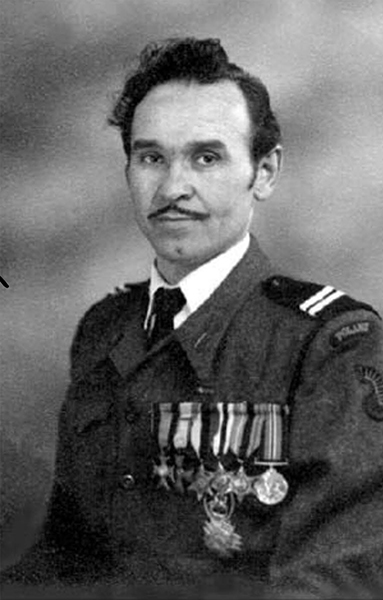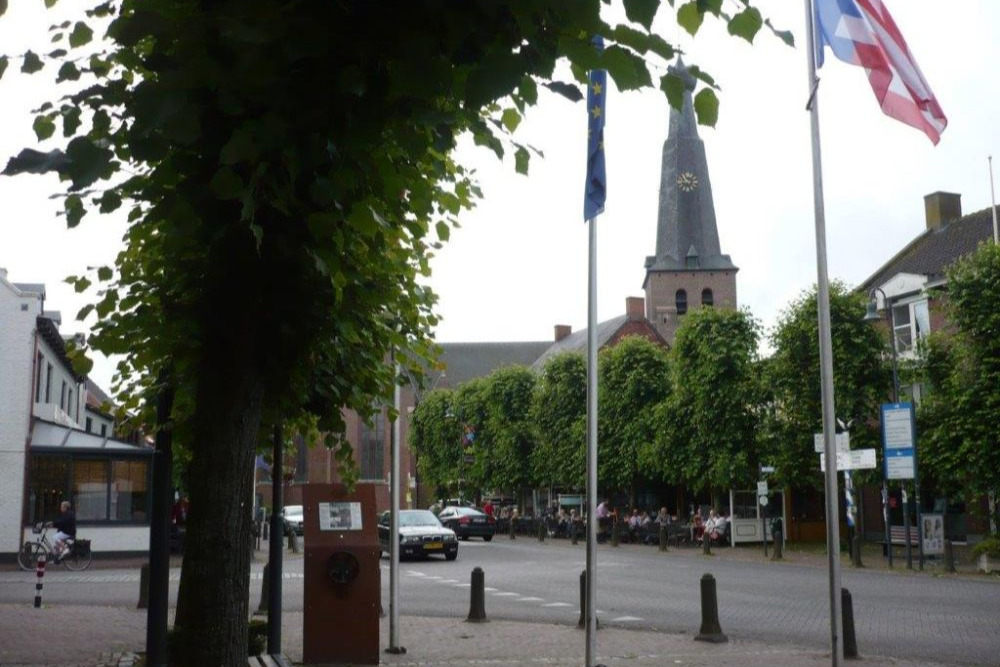Pirog, Jan
- Date of birth:
- October 21st, 1919 (Rohatyn, Poland)
- Date of death:
- August 30th, 2009 (United Kingdom)
- Nationality:
- Polish
Biography
Drafted by Polish army on October 19th, 1937.
He was still serving his mandatory military service in Kutno when WW II broke out and the Nazis attacked Poland. Jan was in the cavalry. His horse was a mare called Zoska (Pronounced ZOSHKAH).
Poland had been under foreign rule for 123 years prior to her independence after WW I. Because of this, it had been impossible to build a sizable, state-of-the-art military during the following 21 years (1918 - 1939), and so they were severely outgunned and overpowered by the Nazi war machine. Poland DID have armor (tanks etc.), but it was very minimal compared to that of the Germans. However, she did defend herself for five weeks before surrendering. Jan went from Kutno, to Lodz, to Warsaw, and his final battle took place in Grabina.
He tried to make his way to Hungary to join the expatriate Polish army there. As far as he knew, his whole family was left behind when the Russians arrested him (remember that Russia and Germany were still allies at this time). Jan states that 8,000 Polish Military personnel were taken to the Siberian Gulag along with him, and only 2,000 were still alive when they arrived at their destination. He believes the purpose of this "relocation" exercise was to wipe out as many of these men as possible.
The Siberian Concentration Camp
Name: Indegirka
Location: Kolyma, USSR
Duration of stay: Two years
Released: When Germany attacked Russia. Jan weighed 35 kilos (approximately 77 pounds). He subsisted on a daily diet of 300 grams of bread and a bowl of watery cabbage soup.
Jan's physical recovery from his malnourishment was swift. Once he got good food and regular exercize, he regained his vigour very quickly. He notes, however, that he suffered from some amnesia as a result of his experiences in Kolyma, and that he never regained all his pre wartime memories.
Jan joined the Polish army in Buzuluk, Russia two months after his release. This was November 1941. He was one of the fortunate early ones (84,000) who were released to join the allied forces in the west. On March 29th, 1942 he was relocated to Tehran, Iran. Later, Polish forces in Russia were forced by Stalin to remain to help him defend against Hitler.
After Iran, he spent four weeks in Egypt where he guarded tanks and ammunition for Field Marshal Montgomery's army.
On September 2nd, 1942, they were moved out on a long, circuitous journey to England, which took 64 days, with a 6 week stop in South Africa. In order to avoid the German U-boats, they went via Rio de Janeiro, where they stopped for five days, and New York. They arrived eventually in Liverpool, England. They initially were sent to Scotland, where they were organized into their various planned military duties. Jan was assigned to tanks and was sent to Catterick in Yorkshire for training.
Normandy 1944
Preparation for the Normandy invasion (D Day) took 6 months, and exercizes took them from Chippenham in South West England to Lanark, Scotland. That was followed by 1 month of rest. Jan says they were used as "special forces" for the very worst battle situations.
Jan landed in Arromanches. They fought the 10th German S.S. armoured Division. I quote from Jan:
"The final onslaught on Germany, I was very sad. We were sold out to Stalin by Mr. Churchill and President Roosevelt in Yalta. We had no home to go to. We stayed in Germany in the British army for two years after the war ended."
The Battle of the border - September 30th, 1944
The Battle on the border began in Belgium in a place called Turnhout and was fought through to Baarle-Nassau in Holland.
"My platoon was attached to the 10th Rifle regiment, (10 P.S.K).
We started to move forwards and my tank went over a land mine, which damaged a caterpillar and disabled us from moving on. I got in touch with my headquarters and they told me to wait. They sent a transport and I sent three men to get a new tank. About twenty minutes later, a German unit of 9 tanks and infantry tried to cut off our regiment. I had to stop them and somehow I managed to do it. My driver was loading the gun and I destroyed four enemy tanks, damaged two more, and killed a lot of Germans soldiers. We did not take any prisoners. There were only two of us, but they turned back from their objective. We saved our regiment!
My friend and I were both awarded the Virtuti Militari cross for this. I already had a cross which is one grade lower (the Krzyz Walecznych), for Normandy, and I had another awarded in a place called Siddeburen in Holland." - J. Pirog - Rotmistrz Pierwszej Dywizji Pancernej V.M. (Platoon Sergeant)
After the War
He met Maria Dominik in Germany in a camp called Dalum. They were guarding the displaced persons camps. They were married on February 9th, 1946.
Jan and Maria were transferred to England on May 2nd, 1947 to the Ullenwood camp near Cheltenham. They stayed there three months. June 30th, 1947 they were transferred to Witley camp, the head office. There they stayed until October 8th, 1948 when he was demobbed.
He worked for a farmer in Bath for a while in his orchard, and then went on to work for an engineering firm. In 1952 he began work in coal mining until the pit was closed down in 1963. His final job after that, which lasted until his retirement was in a container factory (Dickinson, Robinson Group).
Do you have more information about this person? Inform us!
- Period:
- Second World War (1939-1945)
- Rank:
- Plutonowy
- Awarded on:
- November 21st, 2004
- Period:
- Second World War (1939-1945)
- Awarded on:
- 2006
- Period:
- Second World War (1939-1945)
- Rank:
- Kapral (Corporal)
- Unit:
- 1st Polish Anti-Tank Regiment, 10th Polish Mounted Rifle Regiment, 1st Polish Armoured Division, Polish Armed Forces in the West
- Period:
- Second World War (1939-1945)
- Rank:
- Kapral (Corporal)
- Unit:
- 1st Polish Anti-Tank Regiment, 10th Polish Mounted Rifle Regiment, 1st Polish Armoured Division, Polish Armed Forces in the West
- Period:
- Second World War (1939-1945)
- Rank:
- Kapral (Corporal)
- Unit:
- 1st Polish Anti-Tank Regiment, 10th Polish Mounted Rifle Regiment, 1st Polish Armoured Division, Polish Armed Forces in the West
Awarded in Siddeburen, The Netherlands. Second award
- Period:
- Second World War (1939-1945)
- Rank:
- Kapral (Corporal)
- Unit:
- 1st Polish Anti-Tank Regiment, 10th Polish Mounted Rifle Regiment, 1st Polish Armoured Division, Polish Armed Forces in the West
- Period:
- Second World War (1939-1945)
- Period:
- Second World War (1939-1945)
- Period:
- Second World War (1939-1945)
- Period:
- Second World War (1939-1945)
- Period:
- Second World War (1939-1945)













